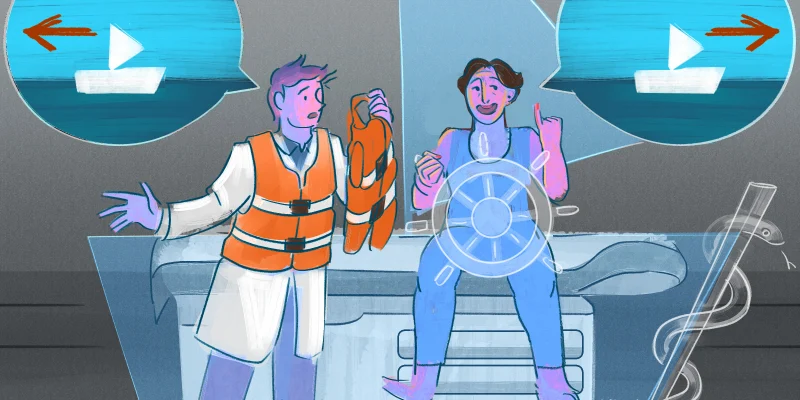Several years ago, I had a patient I’ll never forget.
Irina was an older woman whom I had seen on and off for years for her back pain that was related to spinal stenosis. She was not thrilled with suffering from back pain, and this brought on the necessity to see a specialist for it. But, for the most part, she was usually reasonably cheerful during our visits. On one occasion, however, she presented very differently to her visit.
When I entered the exam room, Irina sat on the table, her eyes downcast. She was visibly saddened by something and only offered one-word answers to my questions. After a while, I could no longer avoid inquiring about what was bothering her.
“I went to the Laser Spine Institute,” she said quietly, sounding ashamed. “But it didn’t help. If anything, I think it might have made things worse.”
“I’m sorry to hear that,” I answered. “But … may I ask what else is going on?”
“I spent my grandchildren’s inheritance on it,” she whispered. “I don’t know how I will tell my family.”
I was surprised by this new information.
I, along with almost anyone living in Florida at the time, had seen ads on TV for the Laser Spine Institute. They advertised their procedures as “minimally invasive,” promising hospital-quality results with little downtime. I remember one popular magazine advertisement I considered particularly ridiculous. It involved three women frolicking on the beach in bikinis. One had a small Band-Aid on the small of her back, almost unnoticeable against her tan skin. The ad asked the viewer: “Can you tell which one of them had back surgery yesterday?”
I knew that the Laser Spine Institute also charged cash for its services. Since this was not considered standard-of-care, most health insurance did not cover it.
I went through the rest of Irina’s exam calmly, but that incident stuck with me. It played a decisive role in shaping my feelings as I watched the rise of cash-based medicine throughout the 2010s and 2020s, with for-profit medical companies increasingly promising miraculous, worry-free results from poorly proven procedures to their would-be customers. This trend raised significant ethical concerns in my mind.
By 2019, the Laser Spine Institute would close its doors nationally, probably due, among other things, to a lawsuit by celebrity Hulk Hogan. He claimed that their inflated promises had cost him $50 million in career performance revenue after their procedures proved ineffective.
By then, countless new medical procedures would be advertised across many platforms, encouraging patients to pay thousands or tens of thousands of dollars out-of-pocket for cosmetic surgery and stem cell injections. Even physicians who offered standard-of-care treatments would consider whether moving to a cash-based advertising and sales model would be more profitable.
I remember attending a webinar where an orthopaedic surgeon was one of the main speakers. The topic of her talk? “Overcoming Your Shame Around Cash-Based Medicine.” In it, she smilingly soothed the audience, convincingly arguing that patients were just like any customer and selling medical services was just like selling anything else. Success was about presenting the product in a favorable light and “overcoming objections,” just like any salesperson would.
I left that seminar with my skin crawling. While I appreciate the freedom that cash-based medicine can give patients to choose treatments their insurance might refuse to cover, patients are not just like any other kind of customer. These are people whose lives and livelihoods are on the line, and “overcoming objections” does not strike me as an appropriate approach to discussing medical procedures with patients.
I thought of other cases I had since that visit with Irina. One doctor I knew had stopped accepting insurance altogether and started operating on a cash-based basis. Her fee for an initial consultation visit was $1,300. And I recently heard author Adam Elnekaveh speak about his experience with TBI. His parents had taken out a loan to pay the $30,000 charged by a stem cell clinic to try to help him recover.
Elnekaveh had made a remarkable recovery given the severity of his TBI and had gone on to write a book about his journey of re-learning to walk, talk, and live independently. But I could not shake the feeling that we were creating a two-tiered health system: one for the rich who had financial bandwidth to spare and another with much fewer options available for everyone else. I was already seeing the effects of American health care price inflation on my patients: Many had begun routinely flying to Mexico to get medical care more affordably.
I do not want to condemn cash-based medicine categorically. Empowering patients to pay for procedures not covered by health insurance is significant. However, advertising for medical procedures should be subject to different rules and best practices than selling a car or a phone. Patients deserve to be informed of the actual prospects for success or failure.
The approach used for recruiting clinical research trials is pertinent. Patients must be informed of all possible benefits and risks in clinical trials before consenting to participate. Failure to list all possible positive and negative outcomes before beginning experimental procedures is considered unethical and illegal. In cash-based medicine, the necessity of informed consent cannot be overstated. Patients deserve to be fully informed of the actual prospects for success or failure before making significant financial commitments.
When permanent changes to a patient’s body and potentially permanent changes to their financial outlook are at stake, the medical community should hold itself to a higher standard of behavior than that espoused in the sales industry. There is an urgent need for higher standards in medical sales to ensure patient safety and well-being.
With the wealth of data available to us as physicians, we often estimate the likelihood of a procedure’s success, failure, or a given complication. Are we not obligated to share that information with our patients, especially if they pay out of pocket for procedures that may not be standard-of-care? Further, should we not consider outcome-based cost sharing where the success of a procedure along with objective criteria can be factored into what the patient ultimately is financially responsible to cover? This approach would benefit from pausing over-inflated promises of results from procedures.
My goal here is not to condemn cash-based medicine as an industry. Indeed, I pay cash for my dental procedures because I want to choose the types of procedures I receive instead of being restricted by what an insurance company will deem medically necessary and, therefore, covered.
But I worry when it’s best practice that a car salesman’s mentality can and should be used to sell medical procedures. As patients, we should also be concerned at some point.
What are your thoughts on cash-based medicine? Share in the comments.
Dr. Francisco M. Torres is an interventional physiatrist specializing in diagnosing and treating patients with spine-related pain syndromes and general musculoskeletal disorders. He is certified by the American Board of Physical Medicine and Rehabilitation and the American Board of Pain Medicine. In his free time, he enjoys working out, playing the violin, and spending time with his five grandchildren. He is a 2024–2025 Doximity Op-Med Fellow.
The patient's name was changed for privacy.
Image by Grinbox / Shutterstock







